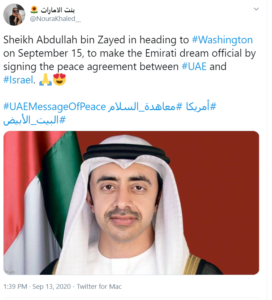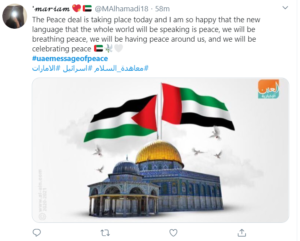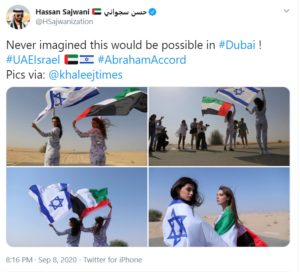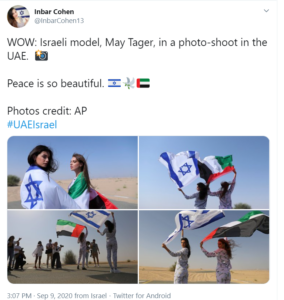Political polarization is captured online before and during official signing ceremony for Israel, United Arab Emirates and Bahrain
The normalization accords signed by Israel, the United Arab Emirates and Bahrain in Washington on Tuesday triggered immediate reactions on social media – unlike the two Arab-Israeli peace treaties concluded before the online era.
“Unlike a few decades ago, everyone can be engaged and express their point of view,” digital media expert Hallel Silverman told The Media Line. “Before social media, the news was told to you. Now you have a voice.”
Before social media, the news was told to you. Now you have a voice
Most of the social media responses around the world have been positive, she says.
“We see a lot of support from the Arab world, the Western world. Certainly, there are exceptions, but the positive posts outweigh the negative ones,” said Silverman, who describes herself on Facebook as a progressive and Zionist.
Still, there has been a variety of opinions about the agreement in Israel, the UAE and Bahrain, with the Jewish state exhibiting the widest range of views.
Before social media, the news was told to you. Now you have a voice.
“We hear diverse perspectives, but they tend to be split along right wing versus left wing,” she stated.
“Bibi fans see this agreement as a big agreement, while those who are against him say that he is leaving the country [to sign the accords] while the economy is terrible and Israelis are stuck in the only developed nation to have two lockdowns,” she said.
She was using the prime minister’s nickname and referring to the three-week, nation-wide coronavirus shutdown scheduled to begin on Friday. Israel also had a spring shutdown.
Netanyahu detractors say the accords are an example of a prime minister acting undemocratically.
“Bibi decided on this agreement without asking anyone. This is a big achievement, but not how things are supposed to be done in a democratic country because there was no vote,” Margalit explained.
“He only emphasized the good things about the deal, but no one really knows the terms and conditions of this agreement,” she went on. “We know what we are getting, but we don’t know what we are giving away.”
Israeli officials have been quoted as saying that the deal with the UAE, a more formal agreement, would take effect only after the cabinet and Knesset, or parliament, approve it.
Margalit adds that those who influence others on social media must first get themselves noticed.
“In order to attract people’s attention, you have to be provocative. This is the name of the game,” she said. “You have to be against the deal or for it; there is no middle [ground]. You can’t be on the fence in Israel these days.”
In order to attract people’s attention, you have to be provocative. This is the name of the game. You can’t be on the fence in Israel these days
She adds that social media can dampen the way Israelis view the agreements.
“If there was no social media, the Israeli public would experience this… as one of the best things that happened to Israel,” she said. “On social media, there is a diversity of opinion, and one person makes the other person think in a different way. It shapes public opinion. You can only hear those who scream the loudest.”
Social media, she notes, can ruin the experience.
“Other events were able to unify Israel,” she stated. “In this case, you only see the reverse.”
Silverman disagrees on the extent to which social media can change people’s minds.
“Social media can change opinions. [However], when people are [with one another, they] actually have a conversation and not yell,” she said.
In contrast to the wide range of opinions on Israeli social media, in the UAE, most posts have supported the deal.
Under the popular hashtag “#uaemessageof peace,” @NouraKhaled wrote the following above a photo of the country’s foreign minister: “Sheikh Abdullah bin Zayed is heading to #Washington on September 15 to make the Emirati dream official by signing the peace agreement between #UAE and #Israel.”

On September 15, @MAlhamadi18 wrote: “The Peace deal is taking place today and I am so happy that the new language that the whole world will be speaking is peace, we will be breathing peace, we will be having peace around us, and we will be celebrating peace.”
Nevertheless, her post made a political statement about the Israeli-Palestinian conflict, with a picture of the Aqsa Mosque capped by Palestinian and UAE flags.

Yet this post could reflect the fact that after the Israel-UAE agreement was announced, there were reports that Abu Dhabi was cracking down on citizens posting against the move.
While Bahraini posts were generally positive, there were more that were negative than there were from Emiratis. Many Bahraini citizens expressing disapproval did so from abroad, some using the “#Bahrainis_against_normalisation” hashtag.
However, there were negative comments emanating from within Bahrain as well.
@AAziz_Almubarak wrote on September 12, the day after the deal was announced: “It is a black day here in Bahrain.”

That day, the same account retweeted the post: “News agencies in Bahrain are removing [the] comments option because they know the truth – nobody accepts [the deal].”
In the spirit of a better relationship, both Arabs and Israelis retweeted the same viral pictures.
There was @HSajwanization, who posted on September 8: “Never imagined this would be possible in #Dubai!”

And @InbarCohen13: “WOW: Israeli model, May Tager, in a photo-shoot in the UAE…Peace is so beautiful.”
